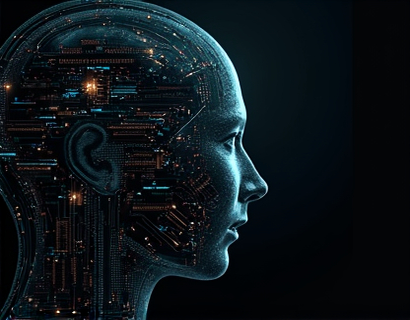Revolutionizing Digital Engagement: The Synergy of Crypto and AI
The intersection of cryptocurrency and artificial intelligence (AI) is redefining the digital landscape, offering unprecedented opportunities to enhance user experiences and drive growth. This article explores the latest advancements in this fusion, highlighting how the combination of these technologies is transforming user interactions and app experiences. By leveraging the unique strengths of both crypto and AI, developers and businesses can create more engaging, secure, and personalized digital environments.
Understanding the Basics: Cryptocurrency and AI
Cryptocurrency, a digital or virtual currency that uses cryptography for security, operates on decentralized networks like blockchain. This technology ensures transparency, immutability, and security in transactions. On the other hand, AI refers to the simulation of human intelligence processes by machines, particularly computer systems. These processes include learning (the acquisition of information and rules for using it), reasoning (using rules to reach approximate or definite conclusions), and self-correction. When combined, these technologies can create powerful tools for enhancing digital engagement.
The Role of Blockchain in Enhancing Trust and Security
Blockchain technology, the backbone of most cryptocurrencies, plays a crucial role in fostering trust and security in digital interactions. By providing a decentralized and transparent ledger, blockchain ensures that transactions are verifiable and tamper-proof. This is particularly beneficial in scenarios where user data and transactions are involved. For instance, in digital identity verification, blockchain can provide a secure and user-controlled method for managing personal information, reducing the risk of data breaches and unauthorized access.
Moreover, smart contracts, self-executing contracts with the terms directly written into code, can automate and enforce agreements without the need for intermediaries. This not only reduces costs but also increases efficiency and reliability. In the context of digital engagement, smart contracts can be used to create trustless systems where users can interact without fear of fraud or manipulation.
AI-Driven Personalization: Tailoring User Experiences
AI's ability to analyze vast amounts of data and derive meaningful insights makes it an ideal partner for personalizing user experiences. By leveraging machine learning algorithms, platforms can understand user preferences, behaviors, and patterns, allowing for highly customized interactions. In the realm of digital services, this means that users can enjoy tailored recommendations, content, and features that resonate with their individual needs and interests.
For example, in a digital marketplace, AI can analyze a user's past purchases and browsing history to suggest products that align with their preferences. This not only enhances the user experience but also increases the likelihood of conversions and repeat visits. Similarly, in social media platforms, AI can curate news feeds based on user engagement, ensuring that users see content that is most relevant and engaging to them.
Enhancing User Engagement Through Predictive Analytics
Predictive analytics, a subset of AI, uses historical data to forecast future trends and behaviors. In the context of digital engagement, predictive analytics can help anticipate user actions and preferences, enabling proactive measures to keep users engaged. For instance, by predicting when a user is likely to disengage, platforms can implement targeted interventions such as personalized notifications or special offers to re-engage the user.
Additionally, predictive analytics can optimize content delivery by identifying the best times to post or send notifications, ensuring maximum visibility and interaction. This data-driven approach not only improves user satisfaction but also increases the overall effectiveness of digital strategies.
Security and Privacy: A Critical Component
As digital engagement becomes more sophisticated, concerns around security and privacy grow. Cryptocurrency and AI can work together to address these concerns by providing robust security measures and enhancing user privacy. Blockchain's decentralized nature makes it resistant to single points of failure, reducing the risk of cyber attacks. Meanwhile, AI can be used to detect and mitigate potential security threats in real-time, further strengthening the security framework.
In terms of privacy, blockchain can enable users to have greater control over their personal data. Through the use of cryptographic techniques, users can share only the necessary information for a specific interaction, ensuring that their data remains private and secure. AI can complement this by anonymizing data and ensuring compliance with privacy regulations, such as GDPR.
Creating Immersive Experiences with Augmented and Virtual Reality
The combination of cryptocurrency and AI is also transforming immersive technologies like augmented reality (AR) and virtual reality (VR). These technologies require significant computational power and data processing, areas where AI excels. By leveraging AI, AR and VR applications can provide more realistic and interactive experiences, enhancing user engagement and satisfaction.
For instance, in VR gaming, AI can be used to create dynamic and responsive environments that adapt to the user's actions, making the experience more immersive and engaging. Similarly, in AR applications, AI can enhance the overlay of digital information on the real world, providing contextually relevant and useful content. Cryptocurrency can facilitate transactions within these immersive environments, enabling in-app purchases and other economic interactions.
Decentralized Finance (DeFi) and User Empowerment
Decentralized Finance (DeFi) is another area where the fusion of cryptocurrency and AI is making a significant impact. DeFi platforms offer financial services such as lending, borrowing, and trading without traditional intermediaries. AI can enhance these platforms by providing sophisticated risk assessment tools, fraud detection mechanisms, and personalized financial advice.
For users, this means greater control over their financial assets and more transparent, accessible financial services. AI-driven bots can automate trading and investment strategies, allowing users to participate in the DeFi ecosystem even if they lack extensive financial knowledge. This democratization of finance, combined with the security and transparency of blockchain, empowers users and fosters a more inclusive financial landscape.
Challenges and Considerations
While the potential of combining cryptocurrency and AI is vast, there are several challenges and considerations to keep in mind. One of the primary challenges is the regulatory environment, which is still evolving and varies significantly across different regions. Ensuring compliance with local laws and regulations is crucial for the successful implementation of these technologies.
Another challenge is the technical complexity involved in integrating blockchain and AI systems. Developers need to possess a deep understanding of both technologies to create seamless and efficient solutions. Additionally, there is a need for standardization to ensure interoperability between different platforms and services.
User education is also essential. Many users are still unfamiliar with cryptocurrency and AI, which can hinder adoption. Providing clear and accessible information about the benefits and functionalities of these technologies can help overcome this barrier.
Future Prospects: The Path Forward
The future of digital engagement is bright, with the continued convergence of cryptocurrency and AI promising even more innovative solutions. As technology advances, we can expect to see more sophisticated AI models that can better understand and predict user behavior, leading to even more personalized and engaging experiences.
Moreover, the integration of blockchain with other emerging technologies, such as the Internet of Things (IoT) and 5G, will further expand the possibilities. For instance, IoT devices can generate vast amounts of data that AI can analyze to optimize smart home systems, urban infrastructure, and more, all while ensuring secure and transparent transactions through blockchain.
In conclusion, the fusion of cryptocurrency and AI is transforming the digital landscape, offering powerful tools to enhance user experiences, drive growth, and foster meaningful connections. By addressing the associated challenges and embracing the opportunities, we can create a more secure, personalized, and engaging digital world.











































